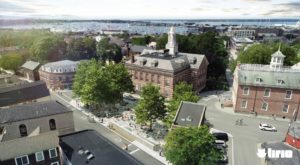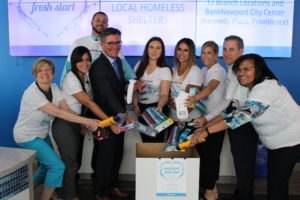Nearly 1,200 Central Providence residents cast ballots earlier this month and voted to allocate a total of $1 million toward eight community projects that will improve the health and quality of life throughout the 02908 and 02909 zip codes. The Nine Neighborhood Fund is a community-lead participatory budgeting initiative. It is the state’s largest direct budgeting effort and work has been facilitated by ONE Neighborhood Builders and its Central Providence Opportunities: A Health Equity Zone team. ONE|NB is one of the state’s leading community development corporations. Election results were tabulated and finalized during a meeting of the Nine Neighborhood Fund Steering Committee on Thursday evening.
Residents aged 13 and older that live or attend school in Central Providence had the opportunity to vote on seven large projects with budgets over $30,0000 and six small projects with budgets of $30,0000.
The four winning large projects in order of votes received were:
- Bathrooms and Plants in Our Parks: $368,000 will be directed to install two new composting toilets at Merino Park and increase access to existing bathrooms in Donigian and Davis Parks. In addition, this initiative will support the planting of native shrubs to enhance the beauty of the green space, encourage community use, and protect the environment.
- Lead-Free Water: $330,000 will be directed to provide all households in the Central Providence neighborhoods who have lead-contaminated pipes with an NSF-certified water filter dispenser. Additionally, these funds will help support community education about lead safety.
- Peer Mental Health: $50,000 will be directed to launch a peer mental health training program for high school students in the nine Central Providence neighborhoods. The training will help young people detect the signs that their classmates and friends may be experiencing mental health issues. Students who complete the training will receive a certificate and have the opportunity to train other students in their high schools.
- Improving Our Bus Stops: $132,000 will be directed to add seating, lighting, and additional amenities near approximately 4 bus stops that currently do not have shelters.
Additionally, four small projects of $30,000 each were funded:
- Life Skills Classes for Youth will provide classes for youth that discuss skills around parenting, personal finance, domestic activities, and other basic life skills.
- Food Bearing Tree Planting will plant 20 food-bearing trees native to Rhode Island (apple, pear, peach, berries, nut trees) around Central Providence to help address food insecurity, lack of green space and tree cover.
- Soccer for Youth will expand the accessibility of soccer-playing to more local youth in Central Providence, by providing free access to equipment, outdoor space, and coaching.
- Bike Distribution and Repair will distribute 50 bikes and repair kits and offer bike maintenance and repair workshops to low-income residents of 02908 and 02909.
The Nine Neighborhood Fund election prioritized accessible voting. Voting took place over the course of two full weeks. Of the nearly 1,200 votes cast, 923 were cast in person at 30 pop-up voting stations and 264 were cast online. More than 200 young people aged 13 to 17 cast ballots.
Projects included on the ballot were developed by community members who served as “project delegates” and narrowed down from more than 300 ideas collected from local residents. The Nine Neighborhood Fund Steering Committee, comprised entirely of residents of 02908 and 02909, led the idea collection process and oversaw the community-wide vote.
Participatory budgeting provides a democratic process for individuals who live in the community to make direct decisions about how to spend a portion of a budget. The Nine Neighborhood Fund is the largest known participatory budget allocation in Rhode Island and is focused on improving community health outcomes and strengthening quality of life throughout Central Providence. Funding for the Nine Neighborhood Fund was made available by the state Executive Office of Health & Human Services and Department of Health and through private grant funds secured by ONE|NB.
Funds cannot be used to supplement existing programs, services, or projects that normally would be funded by state or local government. In addition, there are program design and cost considerations to ensure that all projects can be achieved and that the sustainability of the project is built into its implementation.


